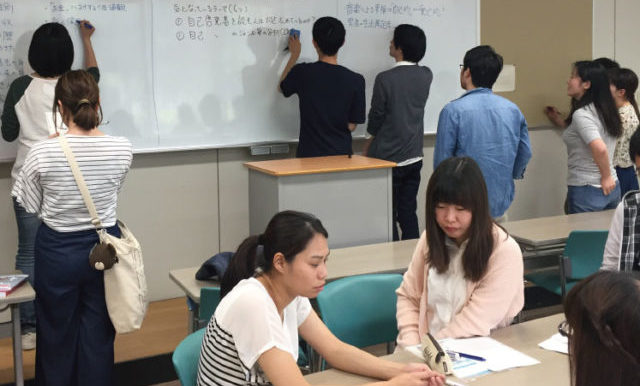 In the Department of Sociology, we aspire to achieve many goals. First, we hope to provide causal explanations of social structures and changes outgoing from individual relationships. We also try to give a normative conception of the kind of society we ought to pursue. Finally, we hope to accurately collect and analyze the data needed to engage in these tasks through surveys and investigations. For this sake, graduate students in this department all pursue their own research interest while learning both classical theories and new hypotheses as well as quantitative and qualitative survey methods. This department also supports students who wish to study abroad, and offers a program to qualify students to become specialized social surveyors as necessary.
In the Department of Sociology, we aspire to achieve many goals. First, we hope to provide causal explanations of social structures and changes outgoing from individual relationships. We also try to give a normative conception of the kind of society we ought to pursue. Finally, we hope to accurately collect and analyze the data needed to engage in these tasks through surveys and investigations. For this sake, graduate students in this department all pursue their own research interest while learning both classical theories and new hypotheses as well as quantitative and qualitative survey methods. This department also supports students who wish to study abroad, and offers a program to qualify students to become specialized social surveyors as necessary.
Laboratory of Sociology
Faculty List
- HIGUCHI Mari Professor
Research Fields: Social exclusion, care labor, family, Quantitative research methods, International comparison - HIRASAWA Kazushi Professor
Research Fields: Soiology - SAKURAI Yoshihide Specially Appointed Professor
Research Fields: Sociology of Religion, Thai and Asian Studies - NG Ka Shing Associate Professor
Research Fields: Nationalism studies, social movements, sociology of culture and religion, East-Asian studies - HIRAMATSU Makoto Lecturer
Research Fields: Urban and regional sociology, Quantitative sociology - NAKAMURA Hijiri Assistant Professor
Research Fields:
Message from Laboratory
Sociology is the scientific study of society. Everything we find in society, including human behaviors, cultures, institutions, social relationships, social interaction, etc. can all be the subject matter of this discipline. The purpose of sociological research is also very diverse; some apply research insights to social policy and welfare, while others focus on the theoretical understanding of society. No matter which theory or methodology sociologists use, sociological research often starts with what C. Wright Mills calls “sociological imagination” in his famous work of the same title (The Sociological Imaginations, Oxford University press, 1959), which he refers to the ability that we connect personal challenges to larger social issues. Mills argues: “Neither the life of an individual nor the history of a society can be understood without understanding both” (1959: 3). A good example to illustrate his point is unemployment. When someone is unemployed, people may seek reasons from that person: “he or she didn’t work hard enough” or “he or she is not smart enough.” In sociology, however, we apply our “sociological imagination” to look beyond the individuals and see the relationships between personal issues and the wider society. Someone’s unemployment can be a result of external social changes, for example, an economic downturn due to the COVID-19 or changes in employment structure. The power of “sociological imagination” enables us to have a different perspective seeing our everyday life and understand that the social phenomenon happening around us are the outcomes shaped by social actions, social interactions, and social contexts.
Sociologists are interested in many questions: What are the causes and effects of social inequality? Why and how people take to the street to advocate for what they believe in? Why do people believe in religion and what are they looking for through their participation? Shall we make our society more friendly to minority groups, LGBT, and the physically/mentally challenged, etc., and how?… The list goes on and on. If you are interested in any of these questions and others and want to cultivate your sociological imagination and knowledge, you are very welcome to join us on a sociological journey!


